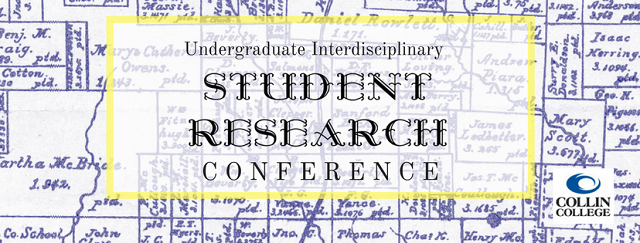| 2018 | ||
| Wednesday, April 18th | ||
|---|---|---|
| 8:30 AM |
Breakfast in Conference Room C Jennifer Warren, Collin College Conference Room C 8:30 AM - 9:00 AM |
|
| 9:00 AM |
Mary Jane Taylor, UNT Conference Room B 9:00 AM - 9:50 AM Panel Chair: Michael Rose, Collin College |
|
| 9:00 AM |
TCU: Honors Research Across the Disciplines Amal Khan, TCU Conference Room A 9:00 AM - 9:50 AM Panel Chair: Wendy Williams, TCU |
|
| 9:00 AM |
The Interactions of NGOs and MNCs: ACLU vs. Jeppesen Najib Gazi, UTD Conference Room E 9:00 AM - 9:50 AM Panel Chair: Julie Haworth, UTD |
|
| 9:00 AM |
Gayla Pearce Conference Room D 9:00 AM - 9:50 AM Panel Chair: Whitney Pisani |
|
| 10:00 AM |
Everything's Bigger in Texas?: Funding, Education, Programs, Policies, & Laws Cristine Espinosa Conference Room D 10:00 AM - 10:50 AM Panel Chair: Linda Muyson |
|
| 11:00 AM |
Mary M. Reisinger Conference Room E 11:00 AM - 11:50 AM Panel Chair: Kay Mizell, Collin College Papers presented: Pesticide Population: Humanity's Future through Chemical Assimilation Pesticides negatively affect humans as individuals and as a group, but that is not the only species under attack. Honey bees, a major pollinator, are also at risk of being affected in many ways from pesticides. Although, individually a few bees are not of concern for most, the entire population of bees would have dramatic effects on a human’s way of life and losing them should “bee” of great concern. Not only do these farming chemicals affect humans and bees directly, the indirect effects of pesticides also take a toll on the entire world’s ecosystem. Research shows if we continue on this current path, there will be severe and negative implications on human health, pollinators, sustainable agriculture, and the whole ecosystem. School Shooting: a Disease in the Shadows The present issue of school shooting has been rampant in the United States which signifies that violence among American youth in public schools have risen dramatically. Since there are many factors of why school shootings happen, there is not one perfect solution. The large amount of social factors of school shootings are a person’s poor upbringing, easy firearm access, lack of cognitive function, and social isolation from social institutions. The combination of these factors means multiple solutions must be implemented as school shooting is a complex topic. Majority of Americans treat the issue in a simple manner, stating that the United States need stronger gun control and quick to blame automatic firearms. This research goes beyond generic solution proposals and states some viable ones for a disease that is spreading in American public schools: using firearms in youth violence. Policy implementations to treat the school shooting issue are discussed later in the article. Briefly, the implementations are anti-bullying programs, academic skill to read for signs of depression and loneliness of children, increase of community resource officers, and bolstering the difficulty of acquiring/buying sale of automatic firearms. |
|
| 11:00 AM |
In Search of the Stolen, Unwanted and Bamboozled: Varieties of Scholarly Inquiry in Honors History Ariel Furman Conference Room B 11:00 AM - 11:50 AM Panel Chair: Kyle Wilkison |
|
| 11:00 AM |
Walks of Life: The Journey of (some) Women Claire Padre Conference Room E 11:00 AM - 11:50 AM Panel Chair: Marta Moore, Collin College |
|
| 11:55 AM |
Jenny Warren, Collin College Conference Room C 11:55 AM - 12:55 PM
|
|
| 1:00 PM |
Sarah Hobbs Conference Room D 1:00 PM - 2:15 PM Panel Chair: Katherine Bell |
|
| 1:00 PM |
Alexandra Neenan, UTD Conference Room A 1:00 PM - 2:15 PM Panel Chair: Jenny Warren, Collin College 4-year University Presenters:
2-year College Presenters:
Health Science Academy Presenters:
|
|
| 2:30 PM |
Taylor M. Jariz Conference Room B 2:30 PM - 3:45 PM Panel Chair: Melanie Kneen |
|
| 2:30 PM |
The Relationship between Political Trust and Health Outcomes in Sierra Leone Grace Reon, SMU Conference Room E 2:30 PM - 3:45 PM Roundtable: Grace Reon, SMU |
|
Skip to main content


